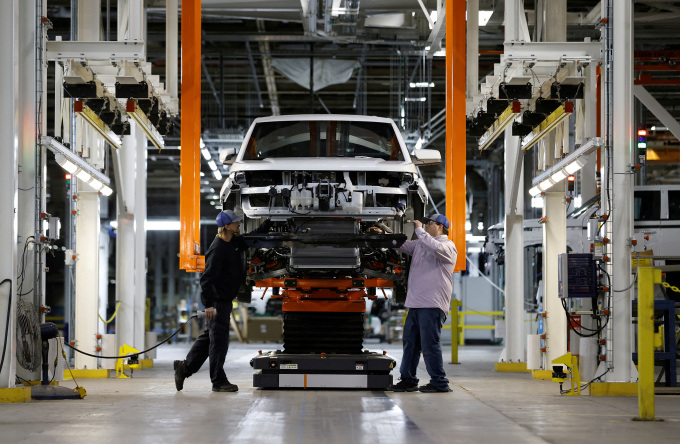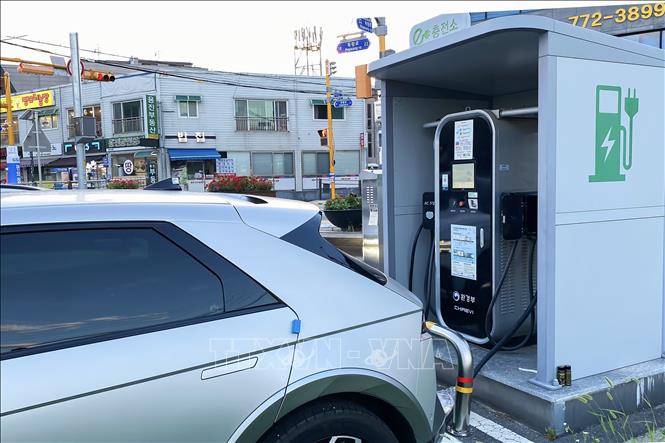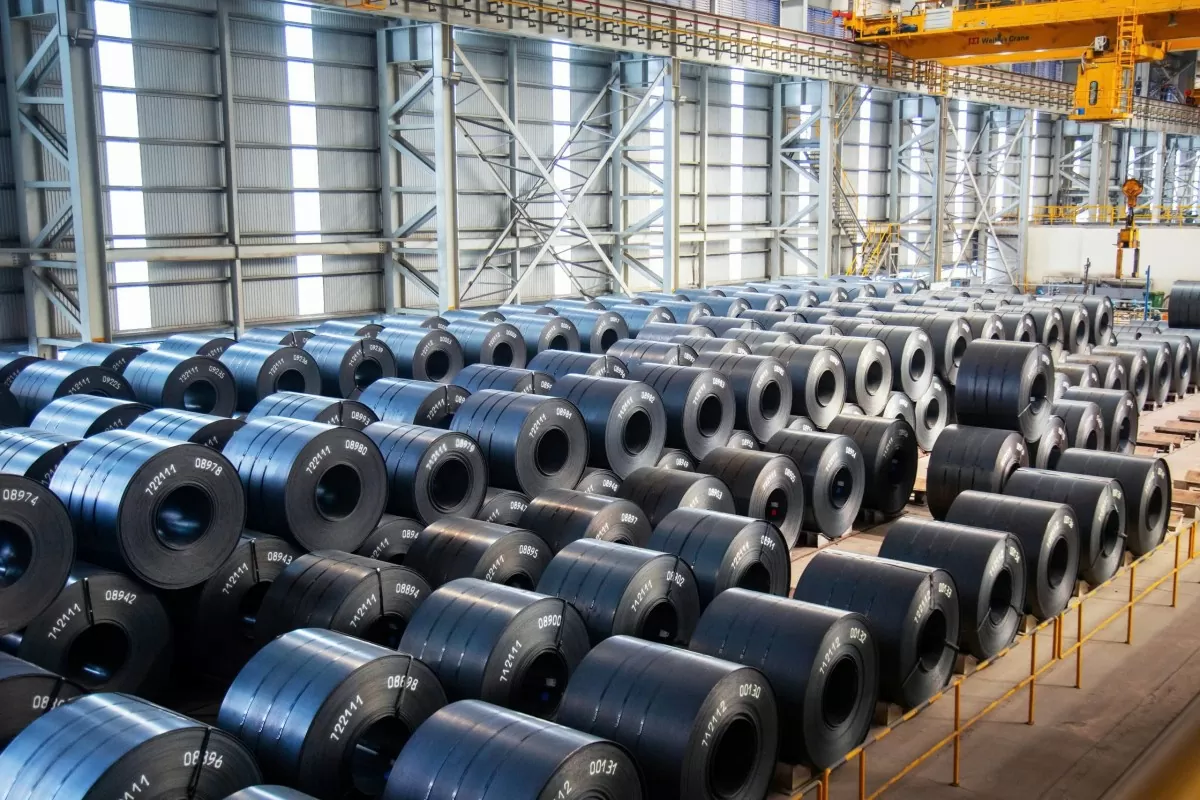Electric car sales in the US have not been able to break through because of high prices, expensive maintenance, low quality trust, and businesses losing more and more money as they sell.
Americans love cars, but not electric ones. According to a Pew Research Center survey, less than two-fifths of Americans plan to buy a pure electric vehicle (EV). Charging networks are proliferating and there are more EVs to choose from, but the survey results are even lower than last year.
The earnings report reflects this. In the third quarter, electric vehicles accounted for just 8% of total auto sales. So far this year, fewer than a million electric vehicles (excluding hybrids) have been sold in the United States. That’s just over half of Europe’s total. Meanwhile, the Chinese are buying four times as many electric vehicles.
From July to September, General Motors (GM) sold 20,000 electric vehicles in the US, compared with more than 600,000 fossil-fuel vehicles. It took dealers an average of 92 days to find a buyer for an electric vehicle, compared with 54 days for a gasoline vehicle. Except for California, Florida and Texas, which account for more than half of US electric vehicle sales, the vehicles are still rare in other states.

The Lordstown Motors Endurance electric pickup truck line at Foxconn's electric vehicle manufacturing facility in Lordstown, Ohio, November 30, 2022. Photo: Reuters
Weak demand is forcing U.S. automakers to reassess ambitious plans for electric vehicles. Ford said in October it would delay a $12 billion investment in electric vehicles. That same month, GM delayed a $4 billion plan to convert a factory into an electric pickup truck production facility by a year. The Detroit giant also abandoned its electric vehicle production targets, including an expectation of 100,000 electric vehicles in the second half of this year, and did not set a new target.
Battery makers that have partnered with automakers to build battery plants in the U.S. are also cautious. In September, SK Battery laid off more than 100 workers and reduced production at a plant in Georgia. Just in November, South Korea’s LG Energy said it was laying off 170 workers at its Michigan plant.
All of this points to the obstacles on the road to electrifying cars in the US, according to the Economist . This revolution will determine the national energy transition because passenger cars account for 20% of all US carbon emissions.
The biggest hurdle is price. The average electric car costs $52,000, according to Cox Automotive, a consulting firm. That’s not much more than the $48,000 average for a gasoline car. But beyond the purchase price, the cost of owning the car over the five years after ownership is a big difference. After factoring in operating costs, it costs an average of $65,000 to own an electric car, due to the need to install expensive home chargers and expensive insurance. That’s $9,000 more than a gasoline car.
The government’s $7,500 tax credit for electric vehicles can offset some of the price disadvantage, but only applies to electric vehicles with batteries that are manufactured or assembled in North America or that have a minimum critical mineral content from countries with which the U.S. has a free trade agreement.
Once the car of choice qualifies for the incentives, the buyer must also file a federal income tax return to process the paperwork. Meanwhile, electric vehicles are still new and the technology changes rapidly, making it difficult for consumers to know how quickly the car will depreciate after purchase. This factor makes them hesitant or not buy at all.
Another reason is that some customers are not yet convinced about quality. In recent years, a number of electric vehicles have been recalled due to faulty battery packs. In addition, according to a quality survey by research firm JD Power, 7 out of 10 models with the most basic problems, such as door handles, are electric.
Still, the low-end EV market has a leg up. Affordable EVs priced below $30,000 seem like a better value for money for Americans, but they’re hard to find. Cheap, high-quality Chinese EVs from companies like BYD have made China the world’s largest EV market and are now flooding Europe. But they’re not making inroads in the U.S. because of high tariffs and other barriers.
Meanwhile, American automakers are following Tesla’s lead by focusing on high-end models in search of higher profit margins. GM and Honda (Japan) recently canceled a joint $5 billion plan to build affordable electric vehicles.
All of this has sent the U.S. auto industry into a tailspin. Consumers’ reluctance to splurge on expensive electric vehicles is forcing automakers to offer steep discounts to clear inventory. Tesla has cut prices several times over the past year. Overall, automakers are offering discounts of nearly 10 percent on electric vehicles, on average, double the discounts they offer on gasoline cars.
But that makes it even harder for automakers to make electric vehicles. Ford is losing $62,000 on every electric car it sells, compared with a net profit of $2,500 on every gasoline car it sells. The continued losses could discourage automakers from investing in electric vehicles, which are a way to attract more customers.
American automakers are still hoping to break out of this vicious cycle. They are mostly delaying investments in electric vehicles, not abandoning them. In the next year or two, many companies plan to introduce dedicated platforms for pure electric vehicles, rather than taking a gasoline-powered chassis and swapping out the internal combustion engine for an electric motor and battery.
Some of the quality issues that have plagued electric vehicles are expected to be resolved as production lines are completed. And from January 2024, tax incentives will also be available at the point of sale, making it easier for buyers to complete the paperwork.
All of this will eventually improve quality, expand product lines, lower prices, and help companies make money selling electric vehicles. Ultimately, the electric vehicle revolution in America may come, but a little later than expected.
Phien An ( according to The Economist )
Source link


![[Photo] General Secretary To Lam receives Ethiopian Prime Minister Abiy Ahmed Ali](https://vstatic.vietnam.vn/vietnam/resource/IMAGE/2025/4/15/086fa862ad6d4c8ca337d57208555715)
![[Photo] The two Prime Ministers witnessed the signing ceremony of cooperation documents between Vietnam and Ethiopia.](https://vstatic.vietnam.vn/vietnam/resource/IMAGE/2025/4/15/16e350289aec4a6ea74b93ee396ada21)
![[Photo] Prime Minister Pham Minh Chinh holds talks with Ethiopian Prime Minister Abiy Ahmed Ali](https://vstatic.vietnam.vn/vietnam/resource/IMAGE/2025/4/15/4f7ba52301694c32aac39eab11cf70a4)
![[Photo] Welcoming ceremony for Prime Minister of the Federal Democratic Republic of Ethiopia Abiy Ahmed Ali and his wife](https://vstatic.vietnam.vn/vietnam/resource/IMAGE/2025/4/15/77c08dcbe52c42e2ac01c322fe86e78b)

![[Photo] National Assembly Chairman Tran Thanh Man attends the summary of the organization of the Conference of the Executive Committee of the Francophone Parliamentary Union](https://vstatic.vietnam.vn/vietnam/resource/IMAGE/2025/4/15/fe022fef73d0431ab6cfc1570af598ac)



























![[Photo] General Secretary To Lam meets with veteran revolutionary cadres, meritorious people, and exemplary policy families](https://vstatic.vietnam.vn/vietnam/resource/IMAGE/2025/4/15/7363ba75eb3c4a9e8241b65163176f63)



























































Comment (0)